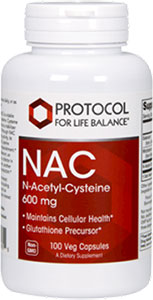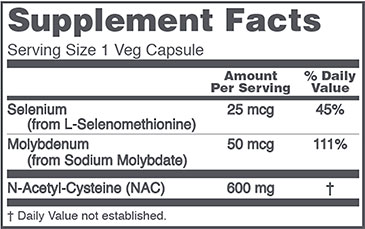

NAC (N-Acetyl-L-Cysteine) 600mg
Contains: 600 mg
Size: 100 count veg capsules
Manufacturer: Protocol for Life Balance
Suggested Retail Price: US$ 20.00

Price: US$ 20.00
A Natural Decongestant!!
For Immune Function, Detoxification, Liver Health, Mental Health, Sinus/Lung Support, Kidney Support, Antiaging & More!
NAC encourages healthy levels of glutathione, the body’s master antioxidant, and promotes bronchial, respiratory, liver, brain and immune health. This unique formula also contains small amounts of 2 important cofactors needed to produce glutathione, molybdenum and selenium.
The amino acid derivative n-acetyl-cysteine (NAC) is fast becoming one of my favorite supplements. It’ll decongest you, cut your cold or flu by about half, raise the antioxidant status of your liver and lungs, protect your kidneys from chemical injury, support detoxification of everything from mercury to acetaminophen to alcohol, and protect your eyes.
Cysteine is a semi-essential amino acid. It’s considered semi-essential because your body can produce it from other amino acids, namely methionine and serine. It becomes essential only when the dietary intake of methionine and serine is low. Cysteine is found in most high-protein foods. N-acetyl cysteine (NAC) is the supplement form of cysteine.
Top Benefits of NAC
1. Essential for Making the Powerful Antioxidant Glutathione
NAC is valued primarily for its role in antioxidant production. Along with two other amino acids — glutamine and glycine — NAC is needed to make and replenish glutathione. Glutathione is one of the body’s most important antioxidants, which helps neutralize free radicals that can damage cells and tissues in your body. It’s essential for immune health and fighting cellular damage and even contributes to longevity. Its antioxidant properties are also important for combatting numerous other ailments caused by oxidative stress, such as heart disease, infertility, some psychiatric conditions and improve a variety of health conditions.
2. Helps With Detoxification to Prevent or Diminish Kidney and Liver Damage
NAC plays an important role in your body’s detoxification process. It can help prevent side effects of drugs and environmental toxins. In fact, doctors regularly give intravenous (IV) NAC to people with an acetaminophen overdose to prevent or reduce kidney and liver damage. NAC also has applications for other liver diseases due to its antioxidant and anti-inflammatory benefit.
3. May Improve Psychiatric Disorders and Addictive Behavior
NAC helps regulate levels of glutamate — the most important neurotransmitter in your brain. By regulating glutamate levels in your brain, NAC may alleviate symptoms of multiple psychiatric disorders and reduce addictive behavior. For people with schizophrenia, bipolar disease ADHD, and depression, NAC may help decrease symptoms and improve overall ability to function. What’s more, research suggests that it may play a role in treating moderate to severe OCD.
Likewise, an animal study implied that NAC may minimize negative effects of schizophrenia, such as social withdrawal, apathy and reduced attention spans.
NAC supplements can also help decrease withdrawal symptoms and prevent relapse in cocaine addicts. Additionally, some studies show that NAC may decrease marijuana and nicotine use and cravings.
4. Helps Relieve Symptoms of Respiratory Conditions/ Natural Decongestant
NAC can relieve symptoms of sinus and respiratory conditions by acting as an antioxidant and expectorant, loosening mucus in air passageways.
As an antioxidant, NAC helps replenish glutathione levels in your lungs and reduces inflammation in the bronchial tubes and lung tissue.
People with chronic obstructive pulmonary disease (COPD) experience long-term oxidative damage and inflammation of lung tissue, which causes airways to constrict causing shortness of breath and coughing. NAC supplements have been used to improve COPD symptoms, exacerbations and lung decline. In a one-year study, 600 mg of NAC twice a day significantly improved lung function and symptoms in those with stable COPD.
Those with chronic bronchitis can also benefit from NAC. By thinning the mucus in the bronchial tubes and boosting glutathione levels, NAC may help decrease the severity and frequency of wheezing, coughing and respiratory attacks. In addition to relieving COPD and bronchitis, NAC may improve other lung and respiratory tract conditions like cystic fibrosis, asthma and pulmonary fibrosis, as well as symptoms of nasal and sinus congestion due to allergies or infections.
5. Boosts Brain Health by Regulating Glutamate and Replenishing Glutathione
Because NAC can penetrate the blood-brain-barrier, it is especially important for maintaining healthy brain and nervous system tissues. NAC’s ability to replenish glutathione and regulate brain glutamate levels can boost brain health (like memory) and improve conditions such as Alzheimer’s and Parkinson’s. The brain neurotransmitter glutamate is involved in a broad range of learning, behavior and memory actions, while the antioxidant glutathione helps reduce oxidative damage to brain cells associated with aging. Alzheimer’s disease slows down a person’s learning and memory capacity. Animal studies suggest that NAC may slow the loss of cognitive ability in those with Alzheimer’s. Parkinson’s disease is characterized by the deterioration of cells that generate the neurotransmitter dopamine. Both oxidative damage to cells and a decrease in antioxidant ability contribute to this disease. NAC supplements appear to improve dopamine function and disease symptoms such as tremors.
6. May Improve Fertility in Men and Women
In some cases, NAC has improved male fertility by reducing oxidative stress that damages or kills reproductive cells. In one study, 35 men with varicocele were given 600 mg of NAC per day for three months post-surgery. The combination of surgery and NAC supplement improved semen integrity and partner pregnancy rate by 22% compared to the control group.
Another study in 468 men with infertility found that supplementing with 600 mg of NAC and 200 mcg of selenium for 26 weeks improved semen quality. Researchers suggested that this should be considered as a treatment option for male infertility.
NAC may also improve fertility in women with polycystic ovary syndrome (PCOS) by inducing or augmenting the ovulation cycle.
7. May Stabilize Blood Sugar By Decreasing Inflammation in Fat Cells/ Aid in Weight Loss
By decreasing inflammation in fat tissue, NAC may reduce insulin resistance and improve blood sugar regulation, but more human-based research is needed.
NAC may also support weight loss through its ability to improve insulin sensitivity, which means it helps the body use insulin more efficiently. This allows fat to be mobilized out of storage and be burned for energy at an accelerated rate.
8. May Reduce Heart Disease Risk by Preventing Oxidative Damage
Oxidative damage to heart tissue often leads to heart disease, causing strokes, heart attacks and other serious conditions. NAC can reduce oxidative damage to the heart, which can decrease the risk of heart disease. It has also been shown to increase nitric oxide production, which helps veins dilate and improves blood flow. This expedites blood transit back to the heart and can lower the risk of heart attacks.
9. Higher Glutathione Levels May Improve Immune Function
Research on certain diseases associated with NAC and glutathione deficiency suggests that immune function might be improved — and potentially restored — by supplementing with NAC.
This factor has been studied most in people with human immunodeficiency virus (HIV). High levels of NAC may suppress HIV-1 reproduction.
In two studies, supplementing with NAC resulted in a significant increase in immune function — with an almost complete restoration of natural killer cells.
A test-tube study indicated that in other immune-compromised situations, such as the flu, NAC may hamper the virus’s ability to replicate. This could potentially reduce the symptoms and lifespan of the illness.
Similarly, other test-tube studies have linked NAC to cancer cell death and blocked cancer cell replication.
Dosage
The typical daily supplement recommendation is 600–1,200 mg of NAC once or twice daily depending if the situation is chronic or acute.
Dosages used in studies were: Bronchitis, 400 mg to 600 mg; COPD, 200 mg 3 times a day; Angina, 600 mg 3 times a day; Gastritis, 1,000 mg; HIV/AIDS, 800 mg.
The University of Maryland Medical Center reports daily doses higher than 7,000 mg could cause toxicity. Long term use can minimally lower your level of trace minerals, so consider taking a multi-mineral supplement. Those who supplement with NAC should drink 6 to 8 glasses of water daily in order to prevent cysteine renal stones. Cysteine renal stones are rare but can occur.
NAC and Covid19 Research Review 2021
• Free shipping on purchases of $200.00 or more
• Wholesalers - call/order toll free 877-266-5711
• Distributors and International Orders (non-US)
• Wholesalers - call/order toll free 877-266-5711
• Distributors and International Orders (non-US)











